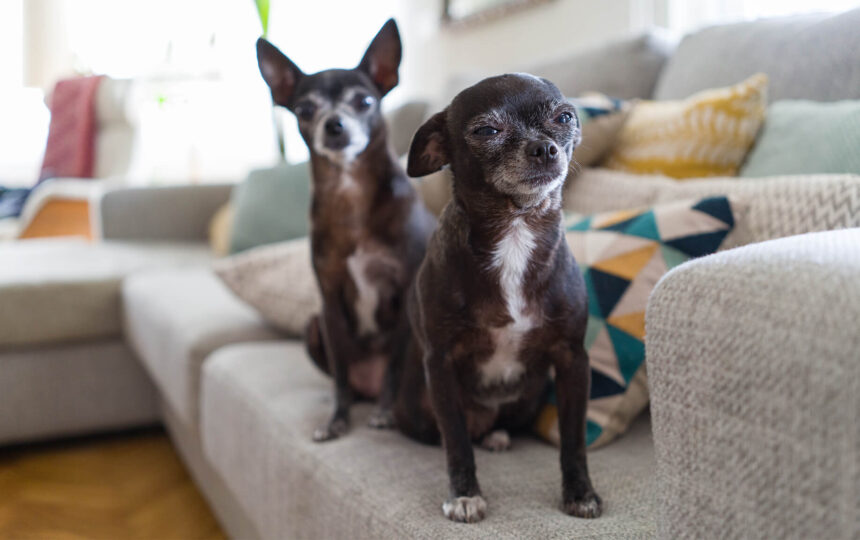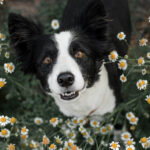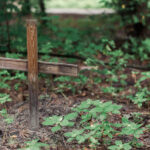As our faithful canine companions enter their senior years, they bring with them a certain dignity and a deeper, more nuanced bond. Caring for an aging dog is a journey filled with tender moments and unique challenges.
Someone once said, “A senior dog brings to our lives a quiet companionship and a depth of trust that is uniquely their own.” This sentiment rings true for anyone who has loved an older dog. Their slower steps remind us to pace ourselves, and their contented sighs teach us the value of simple comforts. But as they age, their needs evolve, and it becomes our turn to offer them the extra care and attention they deserve.
Let’s explore 11 essential ways to support your senior dog in their golden years. From adapting their diet to ensuring their environment is comfortable and safe, each point offers practical advice and fun tricks to enhance your dog’s quality of life. We understand that as dogs age, their physical abilities may decline, but their capacity for love and enjoyment remains unchanged.
Along with physical well-being, we’ll delve into the importance of mental stimulation and bonding, ensuring your senior dog’s days are not just comfortable but also filled with joy and love. Let’s embark on this journey together, cherishing every moment we have with our loyal, aging companions.
1. Regular Vet Checkups: Regular veterinary visits are essential for senior dogs. These checkups allow for early detection of age-related issues such as arthritis or kidney problems. To make these trips less stressful, associate vet visits with positive experiences. Have a special toy or treat reserved exclusively for these outings, turning a routine checkup into a much-anticipated event.
2. Balanced Diet: Adapting your dog’s diet to their aging needs is crucial. Senior dog formulas, which are easier to digest and support joint health, can be an excellent choice. Look for foods rich in high-quality protein, essential fatty acids, and lower in calories to match their slowing metabolism. To keep mealtime exciting, introduce puzzle feeders, which provide mental stimulation as well as nourishment.
3. Regular Exercise: Exercise remains important for senior dogs, but it should be adapted to their changing capabilities. Instead of long, strenuous hikes, consider shorter, gentler walks. For a fun twist, incorporate games like hide and seek with treats around the house or garden, encouraging your dog to move around without placing undue strain on their joints.
4. Dental Care: Oral health is vital for aging dogs. Regular teeth brushing and dental check-ups can prevent many problems. Make dental care enjoyable by using flavored toothpaste, and offer dental chews or toys specifically designed for older dogs. This not only helps maintain healthy teeth but also turns a routine chore into a pleasurable activity.
5. Comfortable Sleeping Area: As dogs age, they may develop joint pain or arthritis, making a comfortable sleeping area a necessity. Orthopedic dog beds provide extra support and cushioning for aching joints. You can make their bed more appealing by placing it in their favorite spot in the house or by adding a beloved blanket or toy for extra comfort and security.
6. Joint Supplements: Many senior dogs benefit from joint supplements like glucosamine and chondroitin. These can help alleviate the symptoms of arthritis and improve joint health. To make taking supplements more enjoyable, mix them with their favorite food or treat, turning it into a tasty reward rather than a medicine.
7. Mental Stimulation: Keeping your dog’s mind sharp is just as important as physical exercise. Engage them in gentle, mentally stimulating activities like teaching them new, simple tricks or providing interactive toys. This not only keeps their brain active but also strengthens your bond with them.
8. Grooming and Skin Care: Older dogs often need more grooming as their coat and skin change with age. Regular grooming sessions help keep their coat healthy and give you the chance to check for any lumps, bumps, or skin issues. Keep grooming sessions short and sweet, praising them and offering treats throughout, to make it a positive experience.
9. Weight Management: Maintaining a healthy weight is crucial for senior dogs to reduce stress on their joints and organs. Monitor their weight regularly and adjust their diet and exercise accordingly. Incorporate fun, low-impact activities like swimming or gentle fetch games to keep them moving without overexertion.
10. Patience and Understanding: As dogs age, they may become less active or more easily confused. It’s important to be patient and understanding of these changes. Spend quality time with your dog, offering gentle petting or simply sitting together in a comfortable spot. This reassures them of your love and presence in their changing world.
11. Regular Routine: Senior dogs find comfort in a regular routine. Try to keep their feeding, exercise, and bedtime schedules consistent. This predictability can be reassuring to an older dog, helping them feel secure and content.
Fun Mental Stimulation and Bonding for Senior Dogs:
In addition to the broader aspects of caring for your senior dog, it’s essential not to overlook the power of mental stimulation and bonding. As physical abilities in older dogs might wane, enriching their minds and nurturing your bond becomes more important than ever. These activities not only keep their cognitive functions sharp but also strengthen the emotional connection you share, making their senior years enriching and filled with love.
Here’s a list of activities that are perfect for keeping your senior dog entertained and fostering a deeper bond:
- Scent Games: Hide their favorite treats around the house and encourage them to find them. This stimulates their sense of smell and provides light exercise.
- Teaching Gentle Tricks: Simple, low-impact tricks like ‘shake hands’ or ‘roll over’ can keep their mind engaged.
- Puzzle Toys: Toys that require them to solve puzzles to get treats are great for mental stimulation.
- Leisurely Walks: Enjoy slow, leisurely walks in a new environment for sensory stimulation.
- Cuddling Sessions: Spend quiet time cuddling or gently petting your dog. This can be calming and reassuring for them.
- Interactive Feeding: Use feeding time for bonding by hand-feeding some of their meals.
- Gentle Grooming: Regular, gentle grooming sessions not only keep them clean but also allow for physical contact, which is comforting for both of you.
- Talking to Your Dog: Regularly talking to your dog can help keep them alert and engaged.
- Memory Games: Use toys or treats to play simple memory games, like hiding a treat under one of several cups.
- Relaxation Time Together: Simply sitting with your dog in a peaceful part of your home or garden can be mutually beneficial.
Remember, the goal is to provide activities that are stimulating but not overwhelming. It’s about adapting to your senior dog’s pace and enjoying these precious moments together.
Caring for a senior dog involves more than just meeting their physical needs; it’s about adapting to their changing lifestyle and providing them with love and comfort. By implementing these 11 strategies, you can help your senior dog navigate the challenges of aging with ease and joy. Remember, each day with your aging companion is precious, and with your support, their golden years can be some of their best.






